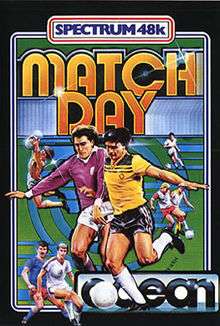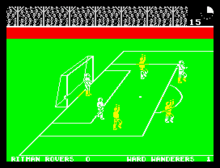Match Day (video game)
Match Day is a football computer game, published by Ocean Software in 1984, originally on the ZX Spectrum and then later released on the Amstrad CPC, BBC Micro, & Commodore 64 systems. It is the first game in the Match Day series, and the title and opening music are references to Match of the Day. It was the creation of programmer Jon Ritman. The BBC Micro version was ported by Chris Roberts.[1]
| Match Day | |
|---|---|
 | |
| Developer(s) | Jon Ritman |
| Publisher(s) | Ocean Software |
| Platform(s) | Amstrad CPC, BBC Micro, Commodore 64, ZX Spectrum |
| Release | 1984 |
| Genre(s) | Sport |
| Mode(s) | 1 or 2 players |
Gameplay

This video game was the first one where large moving footballers characters could dribble, throw-in, take corners, etc. on ZX Spectrum. The game uses modified sprites from a previous title Bear Bovver to create an almost isometric, but still ultimately side-on football title.[2]
The game was included on the 1986 compilation They Sold a Million II,[3][4] along with Bruce Lee, Match Point, and Knight Lore.
The game had 8 teams that the player could choose, such as Ritman Rovers, Clarke PR and Ocean United. Players could rename the teams and redefine the team colours.
Sequels
The sequel, Match Day II was much the same but incorporated two features still used today in most football titles - a deflection system, the ball could bounce off players, which meant headers were possible, and a shot power system, although it was as easy to accidentally backheel the ball with this system, as it was to hit a powerful shot. The game is also similar to a previously, not published game by Jon Ritman, Soccerama.[5]
Later, in 1995, Jon Ritman tried to release Match Day III, but due to copyright problems he had to change the name of the game to Super Match Soccer.
References
- http://www.usgamer.net/articles/chris-roberts-star-citizen-profile
- Sport Games review Archived 2008-02-17 at the Wayback Machine at zxgoldenyears.net
- https://spectrumcomputing.co.uk/index.php?cat=96&id=11372
- http://www.mobygames.com/game/they-sold-a-million-ii
- "Interview with Ritman at amstradmuseum.com". Archived from the original on 2009-06-07. Retrieved 2010-11-29.
External links
- Match Day at SpectrumComputing.co.uk
- It Really Is All Over at Eurogamer
- History of Computer Soccer at members.lycos.co.uk/Crispin_S